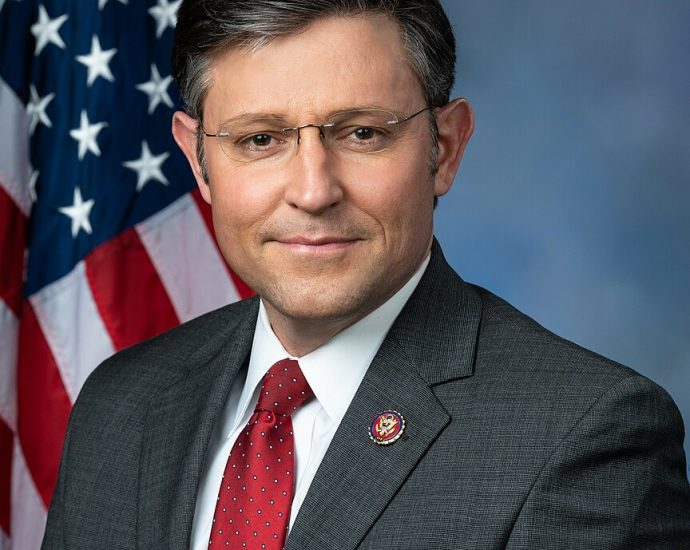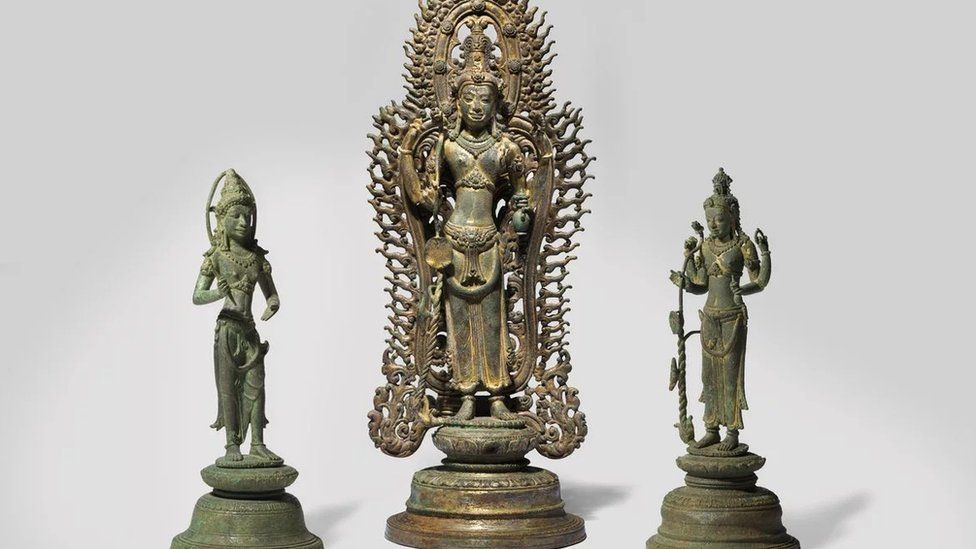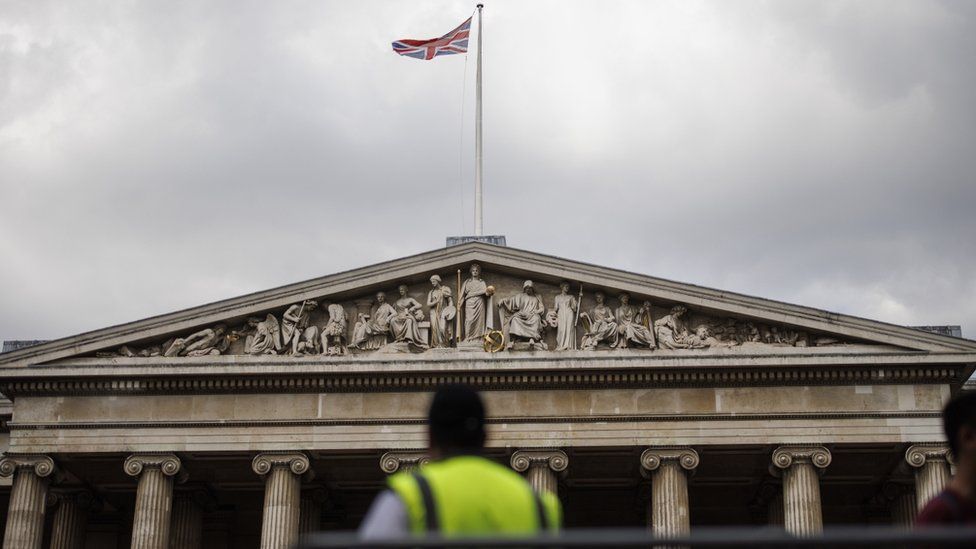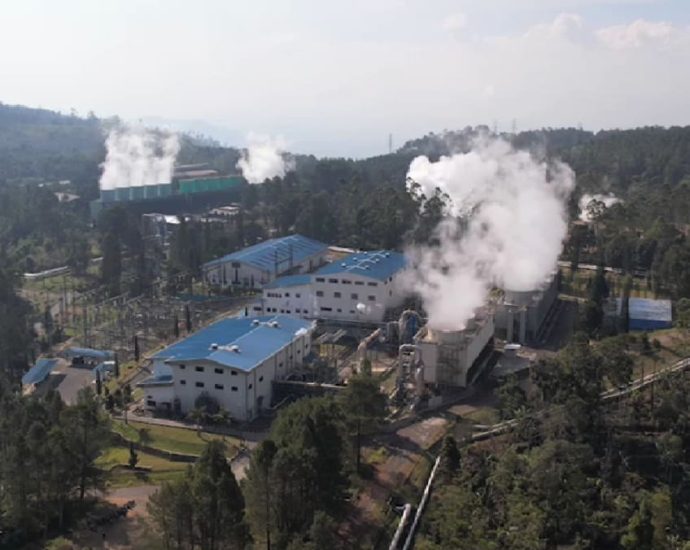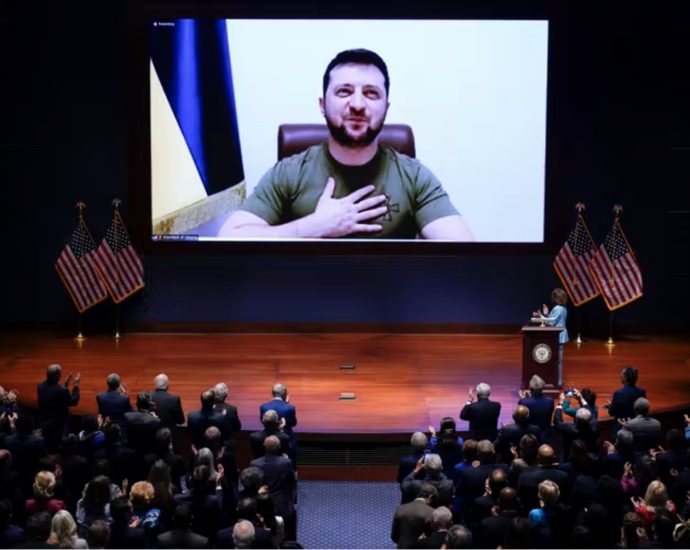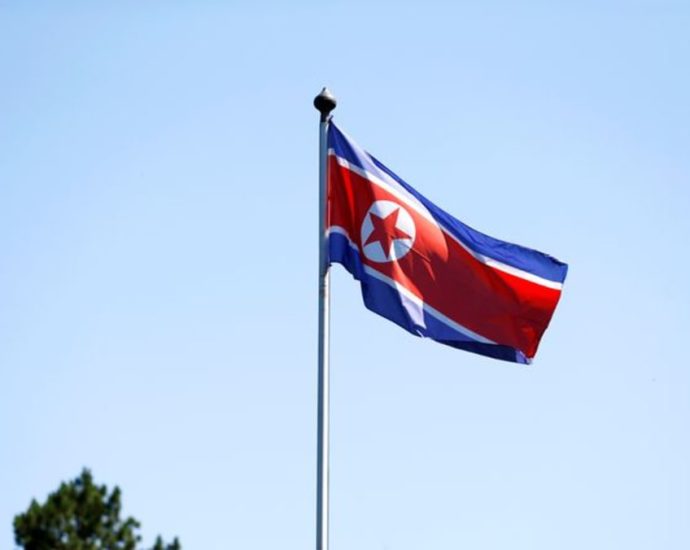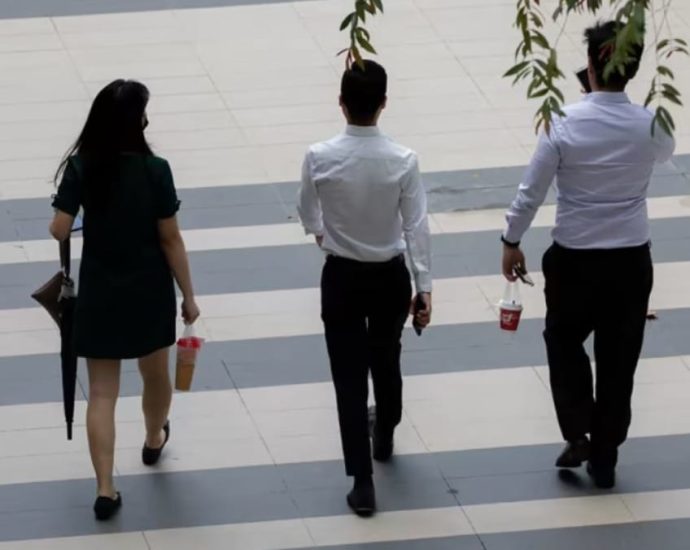Polarization less than it appears

Quantitative and Qualitative Polarization Trends
David Woo and David Goldman take stock of polarization trends across economic, market, and political arenas, including a decline in the share of Chinese foreign reserves held in US Treasury securities, and various dimensions of the Israel-Hamas conflict in Gaza.
Military conflict risks: Spillover of Israel-Hamas war
David Woo analyses the results of the RIWI-Unbound Military Conflict survey, which found that some 40% of Israelis and Iranians expect military conflict between their two countries to intensify in the coming weeks, a slight decline from the previous week.
Investment themes in a polarizing world
Scott Foster and David Woo examine a range of investment options linked to themes linked to negative polarization risks for the Eurozone, reserve diversification away from Treasuries by the likes of China and the Saudis, the tech race in electric vehicles and semiconductors, and more.
Germany under siege and ready for government change
Uwe Parpart examines the declining support for Germany’s ruling coalition parties and growing support for the opposition parties, particularly due to their stance on migration, and suggests that a government change in Germany is becoming increasingly likely.
Ukraine’s Zelensky faces diminishing Western support
James Davis discusses growing concerns within the Zelensky government in Ukraine regarding diminishing Western, especially US, support. The Ukrainian leader believes that to maintain global attention on Ukraine, he must continue offensive operations despite personnel shortages.
Biden’s $110 billion fiasco
Now that the US House of Representatives has finally, after four tries, elected a Speaker, business can resume in that chamber.
As all money bills by law must originate in the House and not in the Senate, one of the first pieces of business will be to take up President Joe Biden’s aid “package” that covers money for Ukraine and Israel as well as money for illegals in the United States and for other purposes.
It makes sense to scuttle the Biden aid package and break it into separate parts. Some of it can be funded (after careful review and clarification); some of it is dangerous and should be dropped by Congress.

The Biden proposal covers only one year of funding for Ukraine (and is in addition to hundreds of millions already in the pipeline for that country).
The Biden package is for an astonishing $110 billion. In one way or another, $61.4 billion will go to Ukraine or be used for operations supporting the Ukraine war, such as more funding for the Pentagon and additional money for intelligence.
An astonishing $16.3 billion would go for what the administration calls “economic security and operational assistance.” This money is earmarked to pay the ongoing salaries of Ukrainian civilian and military officials and to pay for their retirement. Nearly half a billion will go to pay for settling Ukrainians in the United States.
Biden is counting on support for Israel as the catalyst to carry Ukraine aid over the top on Capitol Hill. He is asking for $14.3 billion for Israel, although it isn’t clear how this amount was arrived at or what it covers. Furthermore, since the Gaza war continues and trouble is brewing on the West Bank, on the Lebanese border, and in Syria, needs are changing almost on a daily basis. It may be too soon to project what Israel will need.
It is worth noting that Israel never made an official request for money from the United States. It did ask for more Iron Dome interceptor missiles and for additional ammunition. The Israeli request was unclear whether it would be funded from existing foreign-assistance legislation, or directly paid for.
Biden is also asking for $10 billion for “humanitarian” assistance including $850 million for migration and refugee assistance. It isn’t clear what refugees the money is supposed to cover, nor is it self-evident why the United States should support refugees from Gaza or elsewhere in the Middle East.
No one has explained why it is in the US interest to take these people in, given the terrible track record of refugees from the Middle East in Europe. No doubt other Arab countries, or Iran, could take Palestinian refugees, but none of them are willing and none want the trouble that would result, sooner or later, after their arrival.
The truth is if the US takes Palestinian refugees in, many will turn out to be terrorists. Their bosses in Gaza and Iran will make sure that happens.
Beyond the Middle East and a new flood of refugees coming to the United States Biden wants to support, the proposed Biden legislation has a staggering $13.6 billion aimed at the US-Mexico border. Some of it would be used to hire new agents and build new holding pens for refugees.
A far smaller amount would be to help against the fentanyl threat, although exactly how is not clear. Not a penny of it is based on any change in the catch-and-release policy of the Biden administration. In fact, the proposal includes $1.4 billion to help state and local governments provide shelter and food services for illegals.
There is no system of oversight for any of the funds in the legislation. The administration openly opposes any accounting for Ukraine money. Although the State Department and White House have complained, here and there, about the vast corruption machine operating in Ukraine, they keep pushing for more and more money anyway.
Some of the money in the legislation is for replenishment of equipment and ammunition handed over to Ukraine. The actual replenishment targets are unclear and it is impossible to say if the proposed billions for replenishment weren’t pulled from a hat.
Some of the systems the US may want to replenish are no longer manufactured. Others, such as 155mm artillery shells, are needed, but it may take some time before new ones in any quantity are manufactured. Israel now needs the same shells too, and leaving the American cupboard bare is not a good idea.
Creating a situation conducive to bringing more refugees to the United States is a dangerous policy, and Congress should refuse to fund doing so. We already can see with perfect clarity what is happening in Europe. Replicating that in the United States is a recipe for disaster.
The proposed border-security legislation does some positive things (more border guards, for example), but it isn’t clear otherwise how the money will be used, and despite the money, Biden and company continue to keep the doors open to illegals crossing the southern border of the United States.
A key concern, now well recognized, is that the open border is inviting terrorists into the US. We catch some of them, perhaps, but others get through. There is no money in the Biden legislation to deal with the southern-border terrorist threat.
What should Congress do?
Congress should not pass a package proposal. Each of the items in the Biden proposal must be carefully examined and justifications for the proposed expenditures must be clarified.
Congress should not be opening floodgates to more immigration, whether legal or illegal. Why, for example, are we Americans bringing Ukrainians here instead of them staying in Ukraine? If, as the administration insists, Ukraine is winning the war, there is no reason for them to come here at all.
By funding states and localities to house and feed illegals, we are encouraging more illegals, including criminals, to come here. These same states and cities asking for money were, in most cases, avid supporters of bringing illegals to the United States. Let them pay for them.
The $110 billion in the package is a lot of money, much more than the US can afford right now. Congress should focus on the most urgent items that need funding, such as immediate wartime needs. Paying salaries and pensions in Ukraine is not a high priority, and not even desirable.
Specific weapons and ammunition that may be needed by Ukraine or Israel should be funded. Beyond that, Congress should separately evaluate replenishment needs and fill the most urgent (such as 155mm shells). When it comes to border guards, funding is appropriate. Separate legislation is needed to support them.
Defense spending also needs a thorough overhaul. Simply stated, the existing procurement system and the lack of supply sustainment weaken the United States. Instead of pouring more and more billions into future weapons, the first order of business should be to improve existing stockpiles.
Beyond that, Congress needs to recognize that the current-day defense industrial base is front-loaded to developing and building new systems (where the big money is) instead of building more of what the military services need in a conflict.
Stephen Bryen, who served as staff director of the Near East Subcommittee of the
US Senate Foreign Relations Committee and as a deputy undersecretary of defense
for policy, currently is a senior fellow at the Center for Security Policy and the Yorktown Institute.
This article was originally published on his Substack, Weapons and Strategy. Asia Times is republishing it with permission.
Australia fires: Dreaded bushfire season turns deadly
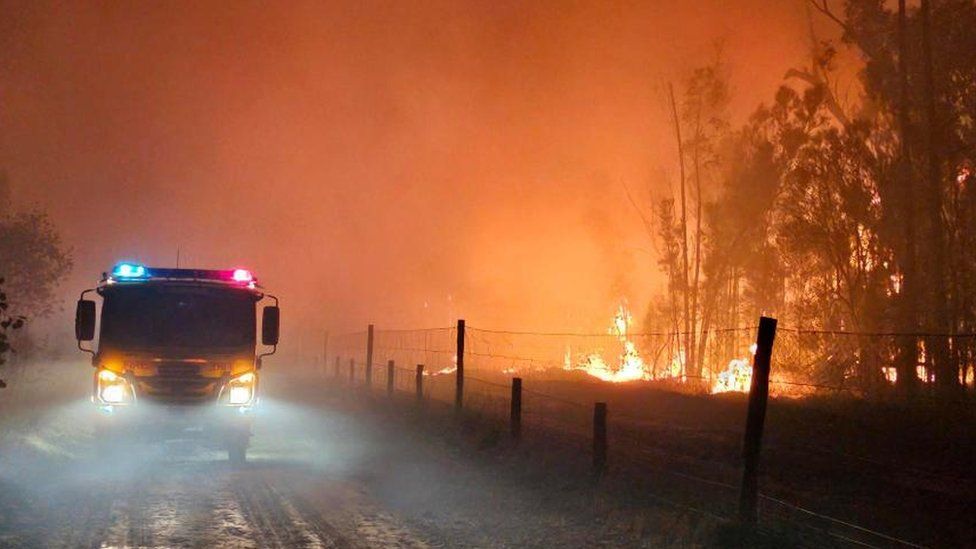 Queensland Fire and Emergency Services
Queensland Fire and Emergency ServicesAustralia’s most serious bushfire season since its so-called “Black Summer” has turned fatal.
As more than 100 fires burned across the country on Thursday, Queensland officials said two people have died in major blazes near the town of Tara.
Two people also died fighting fires in New South Wales (NSW) last week.
Authorities have for months warned a cocktail of conditions means this bushfire season will be extremely dangerous.
In a briefing, the Queensland Fire and Emergency Services said about 350 people had been evacuated from the Tara region, where an out-of-control fire has so far burned through more than 11,000 hectares of land and destroyed 16 homes.
They said a man died on Tuesday night while trying to protect his property, and a woman died on Wednesday after suffering a cardiac arrest while preparing to evacuate.
Overnight dry lightning storms sparked several new blazes in the same region. Many are under control but one has triggered an emergency warning.
But conditions are likely to worsen again on Thursday, with both temperatures and wind speeds expected to increase.
“[It] will again be another challenging day for us today, as we head into areas of extreme fire danger,” Rural Fire Service acting assistant commissioner Peter Hollier said.
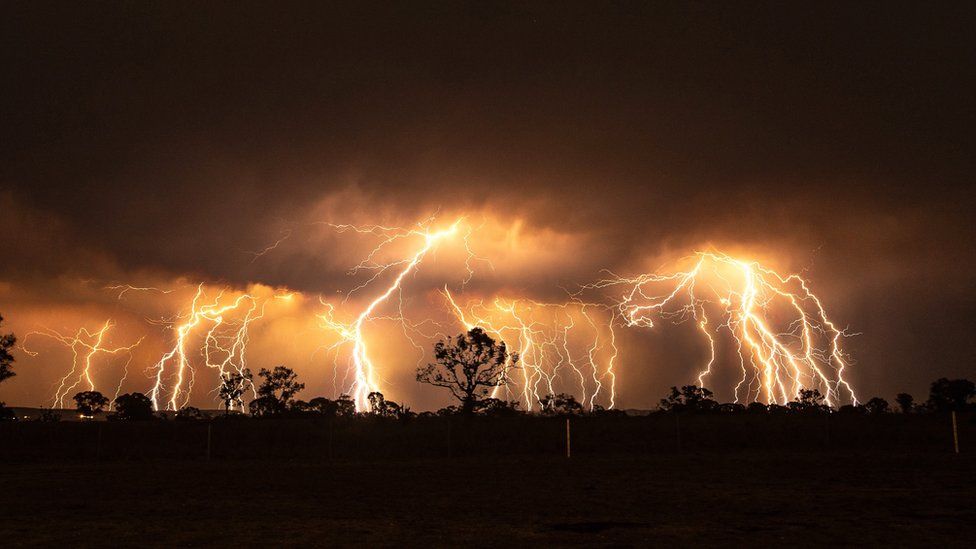
Elsewhere, firefighters are also battling to put out blazes in New South Wales (NSW), Victoria and the Northern Territory.
In NSW last week a veteran volunteer firefighter died of a medical episode while on duty in the state’s north, and another man died while trying to protect his property on the mid-north coast. Authorities earlier this week said they believe three large fires in that area had been deliberately lit.
Australia has been on high alert for bushfire danger. This is because of years of rain-driven plant growth, which is drying out after the warmest winter on record, and an El Nino-affected summer that promises more hot and dry months.
The country has reeled from disaster to disaster in recent years, as it feels the effects of climate change.
Earlier this month towns in Victoria were threatened by bushfires only to be forced to prepare for floods just hours later.
The current bushfire season also comes after several years of record-breaking floods, which followed the Black Summer bushfires in 2019-20, which themselves followed years of drought
The world’s top climate scientists have warned that a future full of worsening disasters is likely unless urgent action is taken to tackle climate change.
PAP introduces another new face in Sengkang GRC

The PAP described Mr Loh as “deeply committed to a meritocratic society that values diverse abilities and offers second chances”.
He sits on the Industry Advisory Committee at the Singapore University of Social Sciences’ School of Humanities and Behavioural Sciences, as well as the Singapore Management University Alumni Philanthropy Council.
In 2019, Mr Loh was elected president of the Institute of Public Relations of Singapore. He is also a fellow at the National Volunteer and Philanthropy Centre’s Company of Good initiative.
He holds a communication degree from Edith Cowan University and master of science degrees from the University of Ireland and Singapore Management University; and also completed an executive programme in public leadership from the Harvard Kennedy School.
Last year, after the revamp of the PAP’s Sengkang GRC team, political analysts said the new faces would have a longer runway to work the ground ahead of the next elections, while giving residents time to evaluate them against the incumbent WP options.
The WP’s victory in 2020 made Sengkang only the second GRC to be controlled by an opposition party, after Aljunied which it has retained since 2011. The defeated PAP team in Sengkang also included labour chief Ng Chee Meng and former Senior Parliamentary Secretary Amrin Amin.
Singapore’s next General Election must be held by 2025.
Multilateral development banks hold key to solving climate crisis
When climate ministers from nearly 200 countries descend on the United Arab Emirates for a UN climate summit in late November, some hard conversations will need to be had on what has – and what hasn’t – been done to mitigate climate change on a global scale.
This year’s event is of particular importance. The 28th Conference of the Parties (COP28) faces a reckoning as it takes stock of progress toward the goals of the Paris Agreement, which set out to limit the average warming across the globe to “well below” 2 degrees Celsius and to pursue efforts to cap warming to 1.5 degrees.
On September 8, the United Nations Framework Convention on Climate Change (UNFCCC) released the Technical Document on Global Stocktake, a sort of check-in on what countries have done so far to prevent a more dangerous climate change. Two findings in this document stand out, and they will feed into the outcomes of the COP28 summit.
First, global emissions are not on track with the desired targets of the Paris Agreement. The UNFCCC’s 2022 Nationally Determined Contributions Synthesis report found that the global emissions are set to rise by 10.6% by 2030 compared with 2010, an improvement from the 2021 projections of 13.7% increase.
However, these efforts are not enough and implementation of current pledges by national governments put the world on track to become 2.5 degrees warmer by the end of the century. COP28 will have to reach a consensus for further reductions in emissions targets, especially by the developed world.
Poor access to funding
This brings us to the second key issue raised by the Global Stocktake. The shift to low-emission energy sources has been too slow. This lag is primarily because of a lack of technology and insufficient climate financing options, especially for developing and low-income nations. Poor countries face obstacles in generating local resources for climate initiatives. The absence of loans from the private sector poses a significant barrier.
The creditworthiness of a nation is generally gauged through macroeconomic parameters and past repayment histories. Unfortunately, many developing nations wrestle with issues related to low GDP, political instability and poor fiscal management, affecting their credit ratings adversely.
Even when loans are secured, they often come with exorbitantly high interest rates, further exacerbating their economic strain. The lack of adequate financing not only hampers their ability to implement crucial climate mitigation and adaptation strategies but also restricts their capacity to participate in global climate initiatives, perpetuating a cycle of environmental degradation and economic hardship.
Moreover, the scant finances often must be juggled between immediate socioeconomic concerns and long-term climate actions, presenting a complex conundrum for policymakers.
Developing countries need better access to institutionalized climate finance. The financial commitments essential for combating climate change are in disarray. The 2009 pledge to mobilize US$100 billion annually for developing nations by 2020 has not been achieved in any single year.
The Organization for Economic Cooperation and Development (OECD) estimates available funding for the year 2020 at a paltry $83.3 billion, a figure that underscores the systemic failure to honor even the most basic commitments. Further, more public funds flow from developed to developing nations for mitigation rather than adaptation.
However, there has been a rise in adaptation finance from multilateral development banks (MDBs), which include such institutions as the as the World Bank and the Islamic Development Bank.
The OECD’s “Towards Orderly Green Transition” report indicates that by 2030, an extra $1.8 trillion annually is required for climate action, representing a quadrupling (toward adaptation, resilience and mitigation) from 2019 levels, primarily for sustainable infrastructure.
That is where MDBs come in. They can substantively address the climate financing challenges faced by developing and low-income countries by amalgamating financial support, technical expertise and policy advice to bolster necessary reforms and resources.
Their capacity to work cohesively with both governments and the private sector facilitates a framework for investment, while their aptitude for providing low-cost, extended-maturity financing mitigates and efficiently shares risks, thereby enticing private investment.
However, the disbursements by MDBs have been lagging, and the current extent of resource transfer to developing countries is inadequate. Unlike many institutions that consistently seek to enhance their reach and efficiency, MDBs appear to have stagnated in their efforts.
In financial terms, MDBs’ gross disbursements are currently half what they were in 1990 relative to the GDP of borrowing countries. On the private-sector front, MDBs now mobilize just $0.60 in private capital for each dollar they lend. Thus MDBs need to reform.
An independent expert group commissioned under India’s G20 presidency has crafted a strategy for MDBs. Tasked with producing two reports, the initial “Triple Agenda” emphasizes the role of MDBs in merging development and climate goals, partnering with governments and businesses to mitigate risks, and becoming more adaptable.
MDBs should enhance their operations, considering disbursements and resources are now below 1990 ratios. The group suggests a tripartite strategy: MDBs should focus on eradicating poverty, boosting shared wealth and aiding global issues like climate change.
There’s also a call to triple sustainable lending by 2030 and introduce a novel funding approach (apart from negotiated equity contributions from sovereign shareholders and discretionary trust funds) to foster versatile collaborations with investors aligned with the MDB agenda.
COP28 needs to advance this issue. Without climate finance for developing countries, Paris Agreement goals won’t be met. The UAE will have a crucial role to take this agenda forward.
This article was provided by Syndication Bureau, which holds copyright.
Australia returns historical artefacts to China
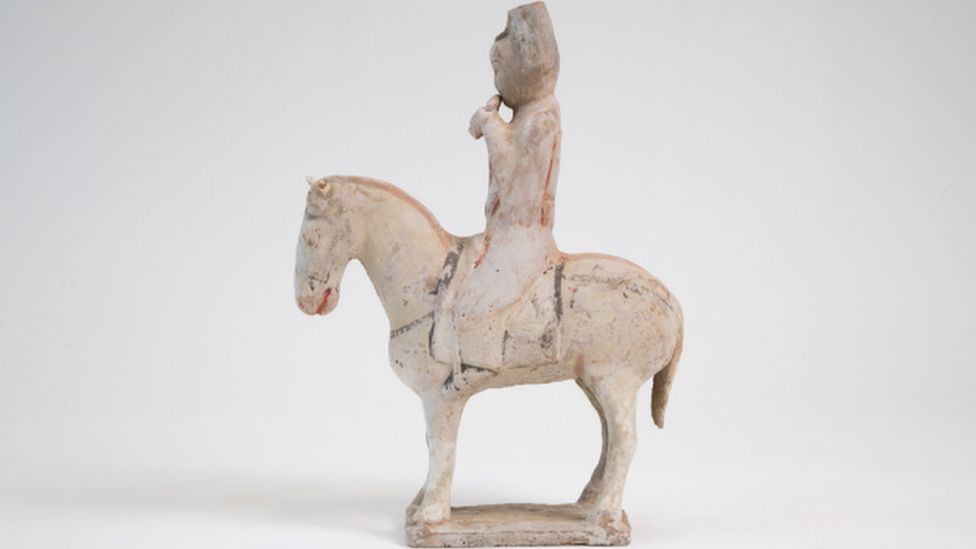 Australian Government
Australian GovernmentAustralia has returned to Beijing three historical artefacts thought to have been illegally exported out of China.
A dinosaur fossil that is more than 100 million years old and two Tang Dynasty figurines were handed to Chinese officials in Canberra.
Police working at the Australian border had seized the items and referred them to authorities for investigation.
The handover comes shortly before Australian Prime Minister Anthony Albanese’s visit to Beijing next month.
“Today we’ve witnessed how two nations can work effectively together to return cultural property to its rightful home,” Minister for the Arts Tony Burke said on Wednesday. “Whether it’s items of cultural significance Australia holds or items overseas that belong to us – they should be returned.”
The items are:
- A fossil of a hyphalosaurus, a long-necked reptile species that lived in north-eastern China between 120 and 133 million years ago
- A Tang Dynasty (618 to 907 CE) figurine depicting a rider on horseback playing a wind instrument. These figures were placed in tombs to ensure a safe journey to the afterlife
- A Tang Dynasty gilt bronze figurine of the Buddhist deity Avalokitesvara, which was likely an altar piece
The ceremony also saw two other items dating back to the Ming and Qing dynasties given to China by the National Gallery of Australia and a private collector.
China’s ambassador to Australia Xiao Qian expressed his “heartfelt gratitude” to the Australians at the ceremony, reported news agency Xinhua.
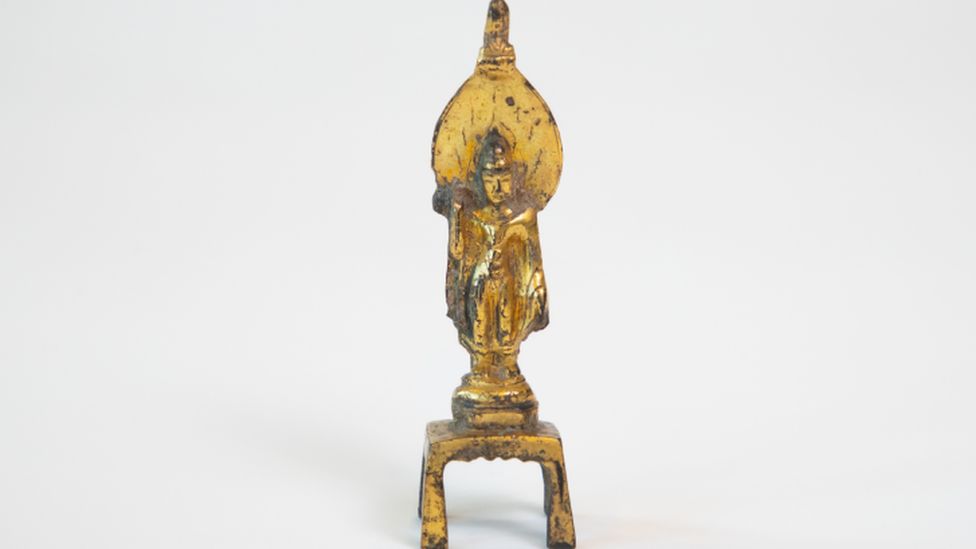
Chinese state media reported that Australia and China have been working closely for the past three years to facilitate the return of illegally imported cultural relics, art items and fossils.
In August, Australia’s national gallery returned three 9th and 10th Century bronze sculptures to Cambodia, after a decade-long investigation found that they were stolen.
It was also announced in March that four Aboriginal spears taken by British explorer Captain James Cook and his landing party when they first arrived in Australia in 1770 would be returned to their traditional owners.
In recent months, Beijing has become increasingly vocal in calling for the return of historical artefacts stolen from China, including items currently owned by the British Museum.

-
-
30 July 2021

-
With its abundant geothermal reserves, Indonesia aims to harvest more green energy
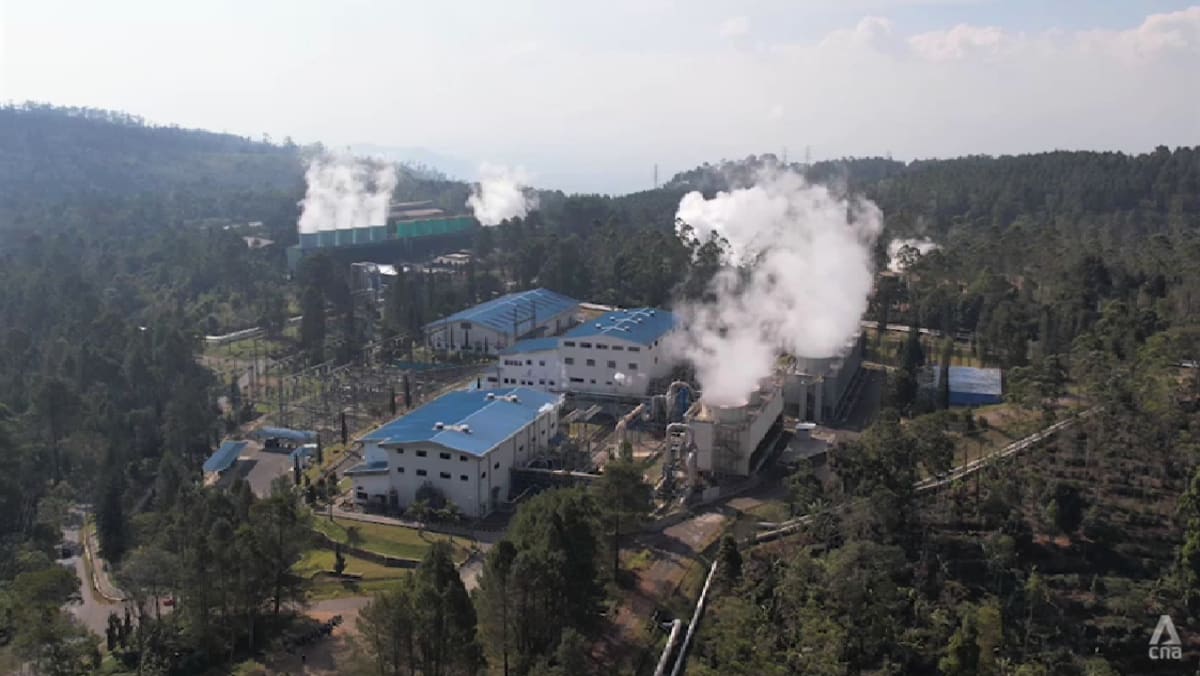
MORE RELIABLE THAN SOLAR AND WIND POWER
Indonesia is one of the top geothermal energy producers in the world, with more than 300 sites.
On the slopes of Mount Guntur, an active stratovolcano in the West Java province, for instance, geothermal energy is harnessed from the Kamojang crater.
Geothermal exploration began in Kamojang in 1926, and the first geothermal well was drilled there during the Dutch colonial era.
After nearly 100 years, the well is still emitting steam continuously at a high pressure today.
The Kamojang geothermal power field, the first in Indonesia, is managed by Pertamina Geothermal Energy.
“The advantage of a geothermal system is that it can operate 24 hours, seven days a week,” said Mr Hanifah Bagus Sulistyardi, operations manager at Pertamina Geothermal Energy (Kamojang).
“The energy supply is not intermittent, compared with solar. The solar energy power plant can only operate a certain number of hours per day, and it cannot operate at night.”
Big strings attached to Biden’s Israel, Ukraine aid
When US President Joe Biden, upon arrival in Israel last week, gave Prime Minister Benjamin Netanyahu what Americans call a “bro hug”, commentators interpreted the gesture as a show of solid support for Israel in its war with Hamas.
One commentator on Israeli TV offered a subtler and, it has turned out, reality-based analysis. Besides showing support, Biden’s gesture also meant, “You’re totally in my hands.”
It’s a reality being digested not only by Israel but also Ukraine, which Biden visited in February and had pledged full backing for its war with Russia. Whether it’s Biden saying “We stand with Israel” or a promise to do “Whatever it takes” to help Ukraine, there are caveats.
In both cases, he is playing chaperone in struggles that each country considers vital to their interests, if not existence. It makes for tense times between allies.
Even before he arrived in Tel Aviv, Biden cautioned Israel to fight within the bounds of the “rules of war” and spare civilians from harm, advice Israel thought it, as a democracy, didn’t need.
On October 25, Biden took a swipe at two of Netanyahu’s long-standing policies: rejection of Palestinian statehood and expansion of Israeli settlements in the West Bank.
“Israelis and Palestinians equally deserve to live side-by-side in safety, dignity and peace. When this crisis is over, there has to be a vision of what comes next,” Biden said. “And in our view, it has to be a two-state solution.”
Biden added criticism of attacks on Palestinians by “extremist settlers” in the West Bank, which amounted to “pouring gasoline” on the already enflamed Middle East.
He also aimed to mold Israel’s Gaza Strip retaliation tactics to his liking. This week, reports from Washington indicated Biden prevailed on Israel to delay a ground invasion, for which Netanyahu has mobilized 360,000 troops.
Washington asked for time to find a way to free some 220 hostages who are in the hands of Hamas, 20 of whom are American citizens.

Israel had wanted to impose a medieval-style siege on the Gaza Strip by barring deliveries of food, water and fuel into Gaza. Washington objected and the bans on food and water supplies were lifted.
Deliveries have been miniscule and fuel shipments are still banned. Hospitals are worried that their petroleum-fueled electric power equipment will soon run out of power.
Biden’s messaging had much to do with his desire to assure allies and other friendly countries that he can persuade Israel to avoid wanton punishment of Palestinian civilians.
Netanyahu has steered clear of directly rejecting Biden’s advice. In a televised speech on October 25, the Israeli leader suggested his ground offensive simply requires a bit more planning.
“We are preparing for a ground invasion. I will not elaborate on when, how or how many. I will also not elaborate on the various calculations we are making, which the public is mostly unaware of and that is how things should be,” he said.
Experts suggested that Israel may not have needed Biden’s prodding to delay its offensive: it is simply not yet ready to move, having been surprised on October 7 and fearing another debacle.
“That’s a huge added dose of anxiety and tension into what is already a tense and anxious, and what is a politically fraught, moment,” said Robert Satloff, an expert in US Middle East policy at the Washington Institute for Near East Studies. “Add it all up and they haven’t made a decision to go in yet.”
Biden himself faces some political pressures at home. Less than a week into the war, dozens of lawmakers urged him to ensure protection for both Israeli and Palestinian civilians. A few lawmakers called for a ceasefire, something Israel has opposed.
Palestinian authorities claim more than 5,000 Gazans have died. Hamas does not segregate military from civilian deaths in their casualty figures. Israeli civilian deaths are up to 1,300.

Dissension has erupted inside Biden’s administration. Critics contend Biden is giving Israel too much of a free hand in assaulting Gaza. Last week, a State Department official resigned, saying he could no longer back a “one-sided” policy that favors Israel.
Ukraine – the other war protagonist Biden is trying to manage – has run into different restraints. There have been disagreements between Kiev’s desire for certain types of weapons versus decisions in Washington about what arms to provide and when.
American and allied aid has been fundamental in thwarting Russia’s plan to quickly conquer much of Ukrainian territory. But Ukraine complained that Washington’s micro-management is making the process slow and crippled Ukraine’s effort to expel the Russians from its territory this year.
“Breaking through a well-prepared defense requires an extraordinary number of capabilities, many of which Ukraine lacks despite generous Western aid,” said Frederick Kagan, an American military expert and frequent critic of Biden’s war management.
“It requires tanks, armored personnel carriers and artillery systems in sufficient numbers to absorb heavy losses while retaining enough combat power to exploit a been penetration. It requires air superiority,” Kagan said.
There have been unexplained gaps between Ukrainian requests for weapons and US decisions to supply them. For example, Biden delayed sending cluster bombs, which Ukraine requested last year until this spring.
Ukraine’s President Volodymyr Zelensky thought the cluster bombs, which are launched by artillery shells that release them in mid-air, would help break through Russian infantry defenses.
The US also declined to provide long-range missile systems that can reach distant Russian weapons that are out of range of Ukraine’s current batch of rockets.
There was a big political disappointment for Zelensky, too. He had hoped Washington would endorse a date for Ukraine’s NATO membership. At a July NATO summit in Vilnius, Lithuania, another post-Soviet state, NATO declined.
Even before he arrived in Lithuania for the summit, Zelensky expressed intense frustration. “It’s unprecedented and absurd when [the] time frame is not set neither for the invitation nor for Ukraine’s membership,” he said. “Uncertainty is weakness.”
After the meeting, Biden told a television interviewer that there was no “unanimity in NATO about whether or not to bring Ukraine into the NATO family now, at this moment, in the middle of a war.”

Later, Biden said individual countries could make bilateral security treaties with Ukraine if they chose. None have done so to date, leaving Ukraine without solid guarantees of steady future support.
On occasion, US officials have suggested that Ukraine’s goal should not be to oust the Russians totally but rather to take enough territory to be in a strong position to negotiate. That idea counters Zelensky’s goal to oust the Russians entirely.
General Mark Milley, who recently retired as Biden’s military chief of staff, said Ukraine had only a “slim chance” of defeating the Russians.
“If the end state is Ukraine as a free, independent, sovereign country with its territory intact, that will take a considerable level of effort yet to come,” he said. “That’s going to take a long, long time, but you can also achieve those objectives – maybe, possibly – through some sort of diplomatic means.”
South Korea, Japan, US condemn North Korea’s supply of arms to Russia
SEOUL: South Korea, Japan and the United States strongly condemned the supply of arms and military equipment by North Korea to Russia and said they had confirmed “several” deliveries of such weapons, a joint statement issued on Thursday (Oct 26) said. Russia and North Korea have denied the transfer ofContinue Reading
Singapore retrenchments rise in Q3, unemployment on a ‘slow uptrend’
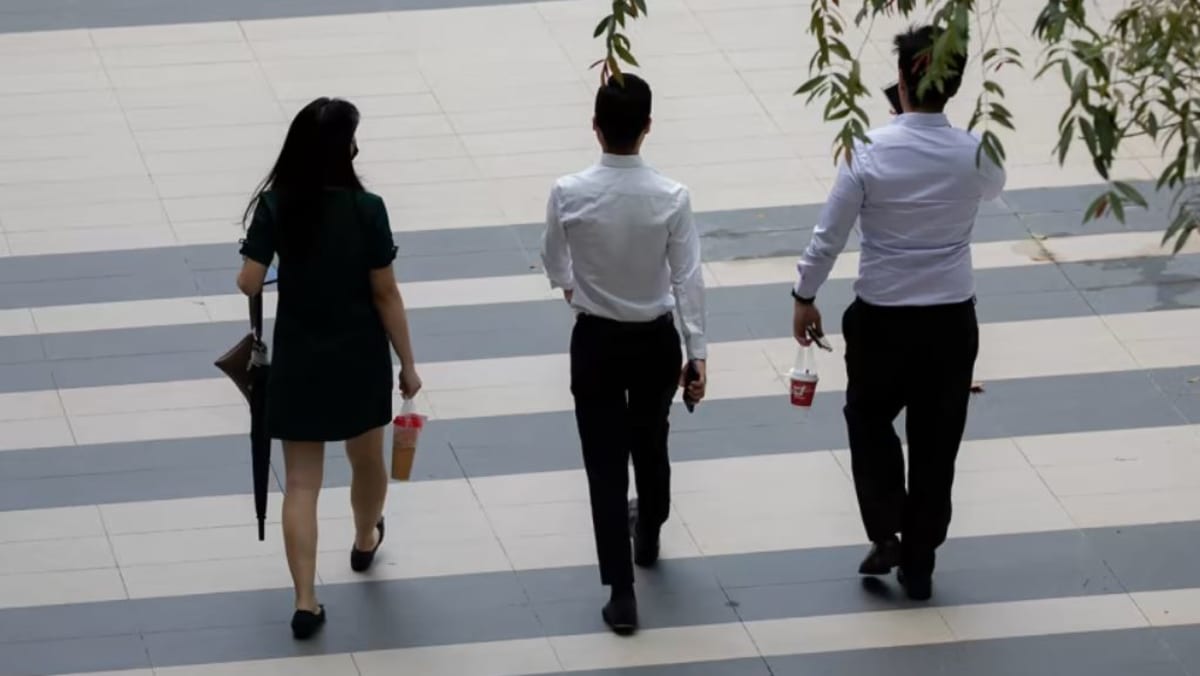
According to MOM, employment growth came from both residents and non-residents, with resident employment expanding in growth sectors like financial services and professional services – which generally had higher-paying jobs – as well as in health and social services.
Meanwhile, non-resident employment expanded in sectors such as construction, retail trade, food and beverage services, and administrative and support services.
UNEMPLOYMENT ON “SLOW UPTREND”, MAY RISE FURTHER
Unemployment rates have been “largely stable and remained low” in September despite the slight increase in July, MOM said.
Preliminary figures showed that unemployment rates in September were 2.8 per cent for residents, 3 per cent for non-residents and 2 per cent overall.
The ministry cautioned that while the labour market has continued to expand, the pace of unemployment growth has slowed compared to a year ago, amid the global economic slowdown.
“Business expectations worsened in September 2023,” it said. “The proportion of firms which indicated an intention to hire in the next three months fell from 58.2 per cent to 42.8 per cent.
“Similarly, the proportion of firms with an intention to raise wages dropped as well, from 28 per cent to 18 per cent.”
The ministry also said that while unemployment rates remained low due to continued labour market tightness, they “have been on a slow uptrend, and may continue to rise further”.
“The government encourages employers and workers to make full use of available programmes to remain competitive and resilient amidst economic uncertainty,” it added.
It also encouraged employers to “press on with business transformation, upskill and reskill their workers, and adapt to the changing environment”.
“We remain committed to supporting our workers to find good jobs despite the economic uncertainty ahead.”


